人教版九年级全册 Unit 14 I remember meeting all of you in Grade 7. Section A 1a-2d 习题课件 (共29张PPT)
文档属性
| 名称 | 人教版九年级全册 Unit 14 I remember meeting all of you in Grade 7. Section A 1a-2d 习题课件 (共29张PPT) | 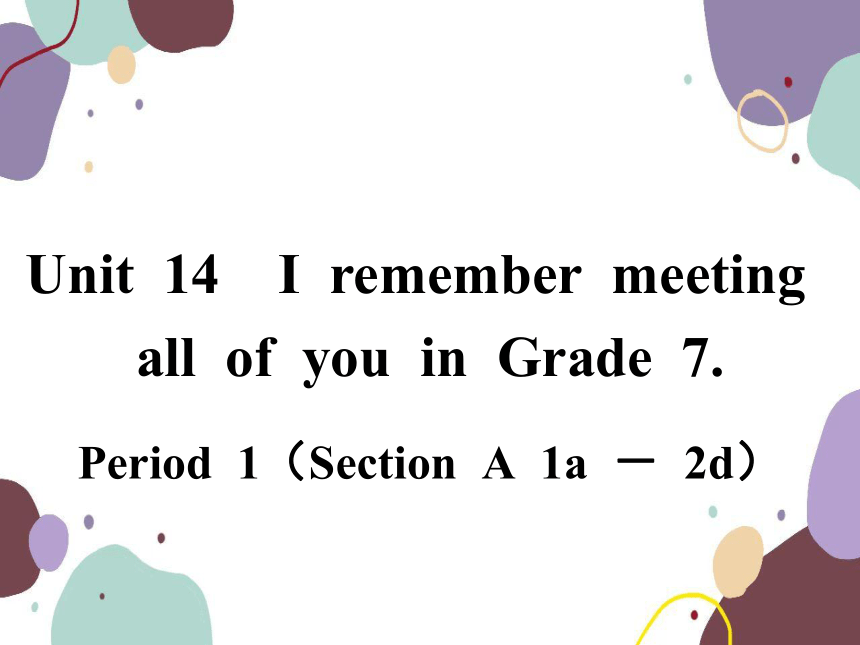 | |
| 格式 | pptx | ||
| 文件大小 | 229.3KB | ||
| 资源类型 | 教案 | ||
| 版本资源 | 人教新目标(Go for it)版 | ||
| 科目 | 英语 | ||
| 更新时间 | 2022-10-24 19:12:15 | ||
图片预览

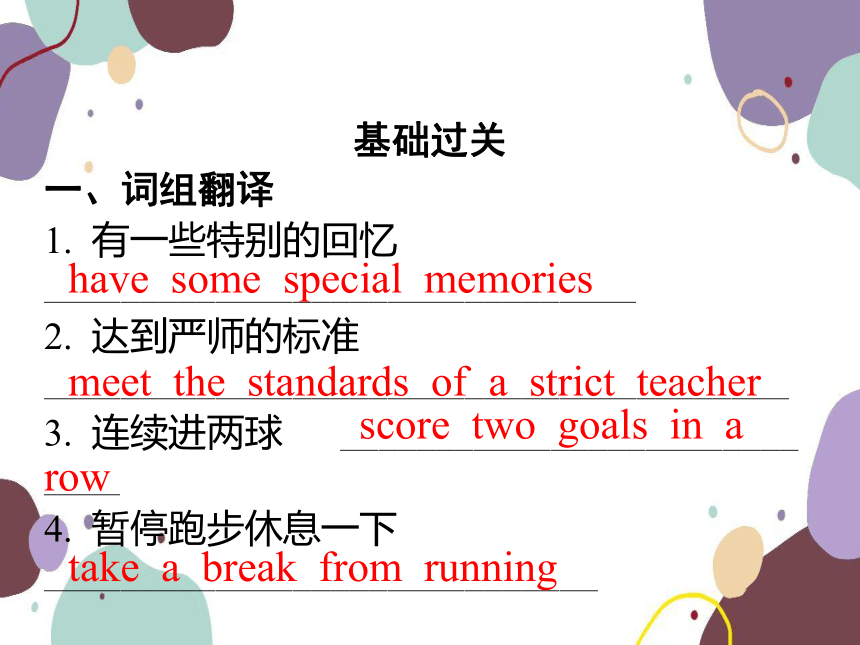
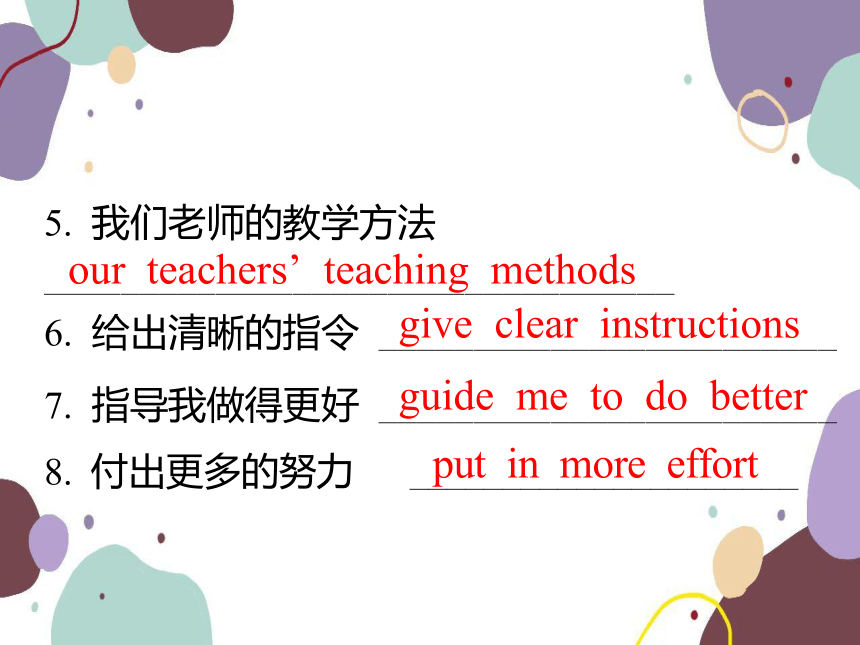
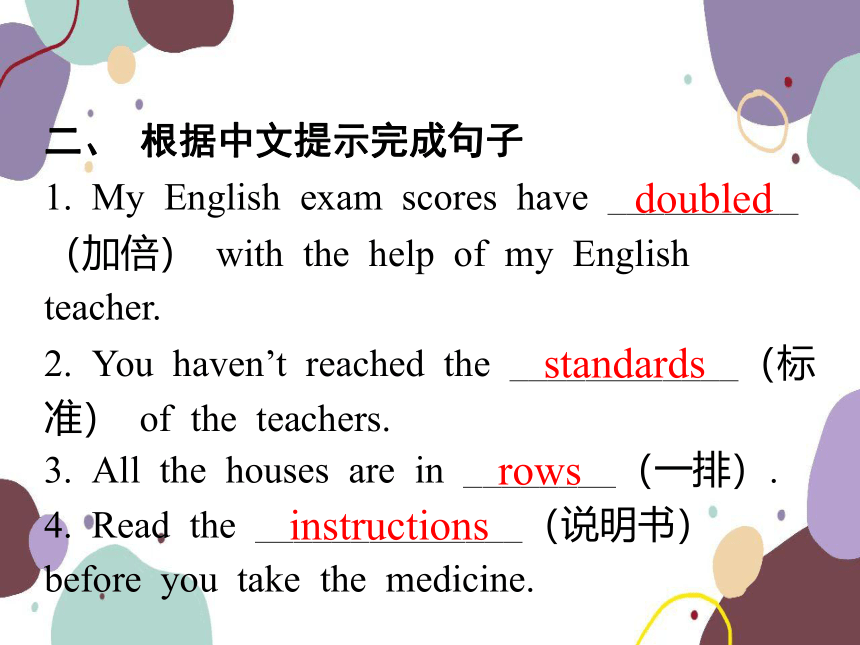
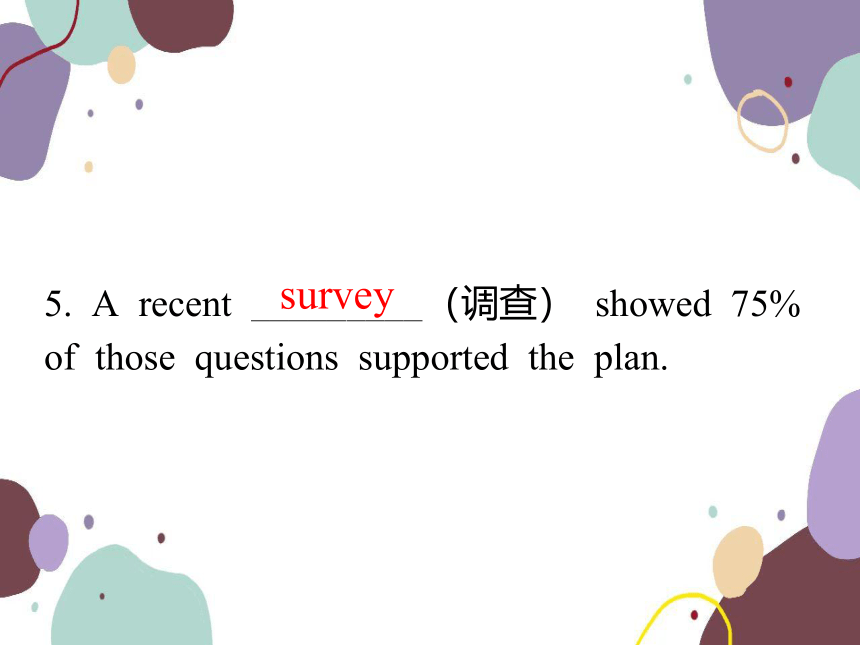
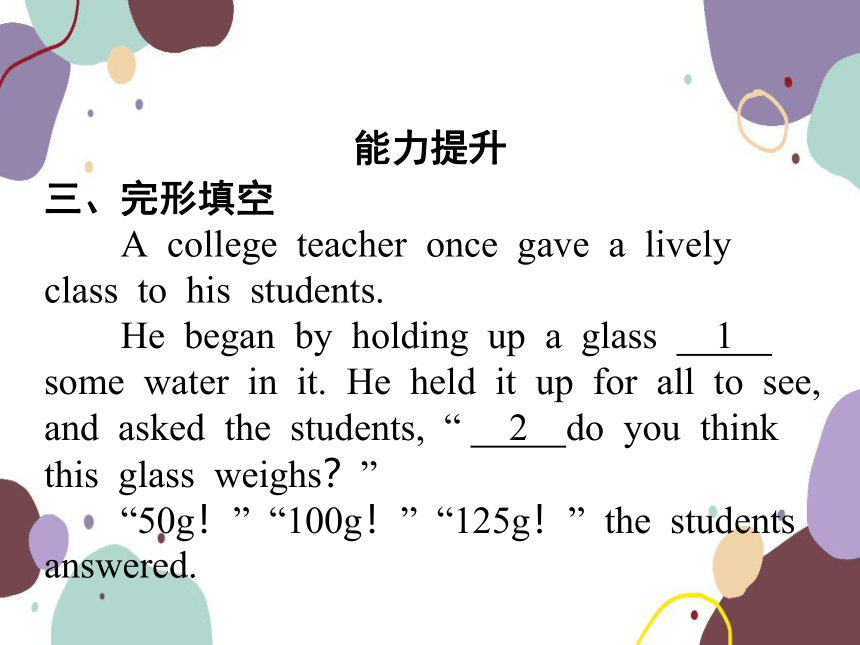
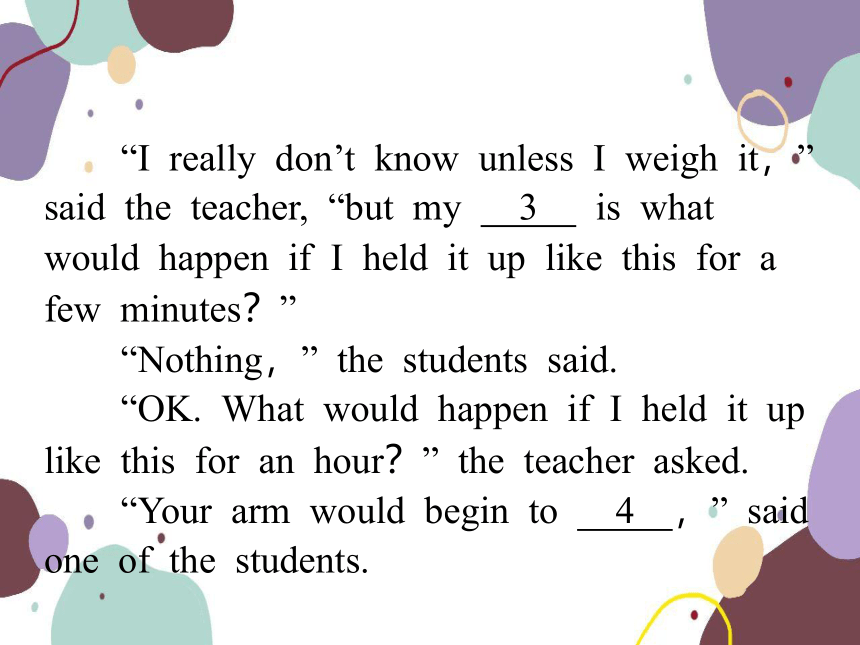
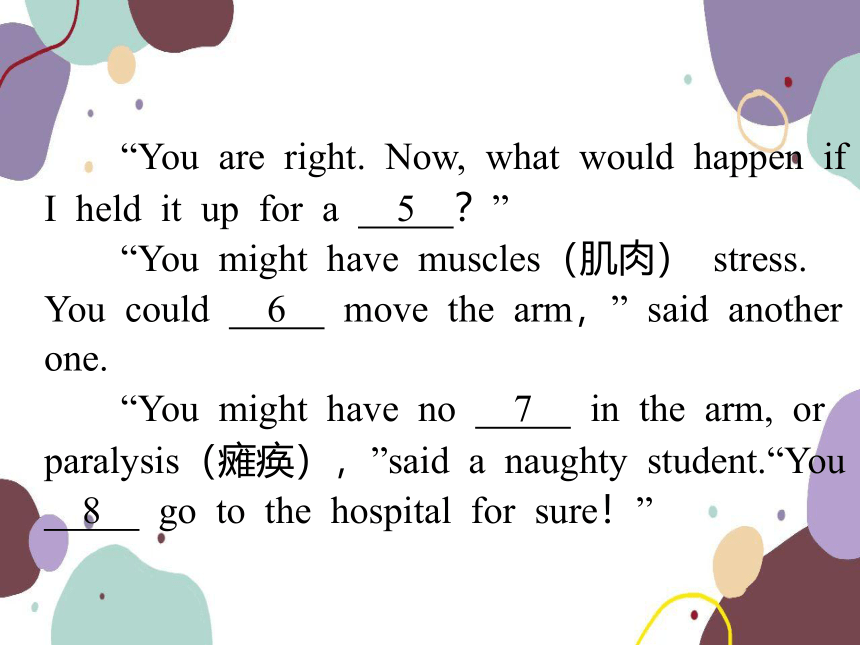
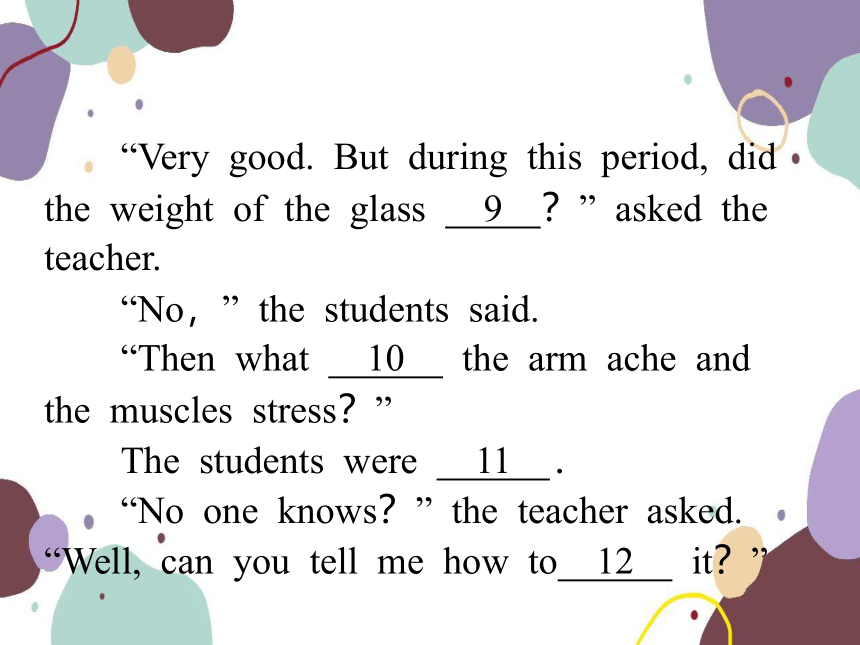
文档简介
(共29张PPT)
Unit 14 I remember meeting
all of you in Grade 7.
Period 1(Section A 1a - 2d)
基础过关
一、词组翻译
1. 有一些特别的回忆
_@1@______________________________
have some special memories
2. 达到严师的标准
_@2@______________________________________
meet the standards of a strict teacher
3. 连续进两球 _@3@___________________________
score two goals in a row
4. 暂停跑步休息一下
_@4@____________________________
take a break from running
5. 我们老师的教学方法
_@5@________________________________
our teachers’ teaching methods
6. 给出清晰的指令 _@6@_______________________
give clear instructions
7. 指导我做得更好 _@7@_______________________
guide me to do better
8. 付出更多的努力 _@8@____________________
put in more effort
二、 根据中文提示完成句子
1. My English exam scores have _@9@_________(加倍) with the help of my English teacher.
doubled
2. You haven’t reached the _@10@___________(标准) of the teachers.
standards
3. All the houses are in _@11@_______(一排).
rows
4. Read the _@12@_____________(说明书) before you take the medicine.
instructions
5. A recent _@13@________(调查) showed 75% of those questions supported the plan.
survey
A college teacher once gave a lively class to his students.
He began by holding up a glass 1 @14@ some water in it. He held it up for all to see, and asked the students, “ 2 do you think this glass weighs?”
“50g!” “100g!” “125g!” the students answered.
能力提升
三、完形填空
“I really don’t know unless I weigh it,” said the teacher, “but my 3 @16@ is what would happen if I held it up like this for a few minutes?”
“Nothing,” the students said.
“OK. What would happen if I held it up like this for an hour?” the teacher asked.
“Your arm would begin to 4 @17@,” said one of the students.
“You are right. Now, what would happen if I held it up for a 5 @18@?”
“You might have muscles(肌肉) stress. You could 6 @19 move the arm,” said another one.
“You might have no 7 @20@ in the arm, or paralysis(瘫痪),”said a naughty student.“You
8 @21@ go to the hospital for sure!”
“Very good. But during this period, did the weight of the glass 9 @22@?” asked the teacher.
“No,” the students said.
“Then what 10 @23@ the arm ache and the muscles stress?”
The students were 11 @24@.
“No one knows?” the teacher asked. “Well, can you tell me how to 12 @25@ it?”
“Put the glass down!” said one of the students.
“Exactly!” said the teacher. “The problems of life are something like this. Think of them for a few minutes in your 13 @26@ and you seem OK. Think of them for a long time and you begin to hurt. Think of them even longer and you will not be able to do
anything. It’s important to think of the challenges in your life, 14 @27@ it’s even more important to put them down at the end of every day before you go to sleep. That way, you are 15 —you wake up every day fresh and strong and can solve any problem that comes your way!”
( @29@ )1. A. by B. on C. with D. to
C
( @30@ )2. A. How many B. How much
C. How long D. How far
B
( @31@ )3. A. question B. idea
C. answer D. plan
A
( @32@ )4. A. lose B. die C. stay D. hurt
D
( @33@ )5. A. day B. summer
C. year D. century
A
( @34@ )6. A. hardly B. quickly
C. widely D. usually
A
( @35@ )7. A. matter B. problem
C. sense D. secret
C
( @36@ )8. A. needn’t B. can
C. shouldn’t D. must
D
( @37@ )9. A. stop B. happen
C. change D. arrive
C
( @38@ )10. A. sent B. caused
C. tried D. repeated
B
( @39@ )11. A. in need B. in silence
C. in danger D. in time
B
( @40@ )12. A. take off B. hear from
C. deal with D. get into
C
( @41@ )13. A. arm B. body
C. head D. mouth
C
( @42@ )14. A. but B. and C. so D. or
A
( @43@ )15. A. worried B. lucky
C. nervous D. relaxed
D
[2019·泰州]
“Why do I live Why do I wish for anything, or do anything Is there anything in
四、阅读理解
my life that will not be destroyed by my death?” Like Leo Tolstoy, the famous Russian writer, many people ask these difficult questions. Tolstoy spent his whole life trying to answer these difficult questions.
As a young man, he thought people could achieve perfection if they tried hard enough. So he worked very hard to be the
best in everything. He thought that he would find meaning and truth in success.
In 1850s, Tolstoy wrote his first stories. He wrote about his life in the army. He also told stories about his childhood. These works were published and Tolstoy became a well-known writer.
He earned the respect he always wanted.
Many rich and smart men met and talked with Tolstoy. Some of them were writers like him. They talked a lot about faith(信仰) and the meaning of life. But soon Tolstoy recognized that these men were not perfect. Now he knew they could not answer his questions about faith.
So in the 1860s, Tolstoy tried a different
way to find the meaning of life. He opened a school for the children of his serfs-the people who worked on his land. These workers were very poor. He wanted to help them because he thought they were more honest than the rich people he knew.
Tolstoy learned a lot from his workers. He understood how they worked hard to
support their families. He began to believe that marriage and family would give his life meaning. So in 1862, Leo Tolstoy married a young woman named Sonya Behrs.
The next 15 years were the best years of Tolstoy’s life. It was during this time that he wrote his most famous books-War and Peace and Anna Karenina. Many experts say that
War and Peace is one of the greatest books ever written. In these books, Tolstoy believed humans should live a simple life and take care of their families. Tolstoy thought this would satisfy him and bring him happiness.
Leo Tolstoy is still a very respected writer today. His faith and writings have influenced many people all over the world.
( @44@ )1. Which is the correct order of the following events
①Tolstoy served in the army.
②Tolstoy got married.
③Tolstoy wrote War and Peace.
④Tolstoy opened a school.
⑤Tolstoy became a well-known writer.
A. ①⑤③②④ B. ⑤①③②④
C. ①⑤④②③ D. ⑤④①③②
C
( @45@ )2. Why did Tolstoy want to be the best in everything when he was young
A. To prepare for his books.
B. To achieve perfection.
C. To make a lot of money.
D. To show his wisdom.
B
( @46@ )3. Tolstoy thought he would learn a lot from his workers because they were __.
A. poor B. honest C. friendly D. patient
B
( @47@ )4. According to the passage, which of the following is the most important to Tolstoy
A. Family. B. Success.
C. Wealth. D. Fame.
A
( @48@ )5. What does the passage mainly talk about
A. Leo Tolstoy: Living for writing.
B. Leo Tolstoy: Influencing the world.
C. Leo Tolstoy: Being the best in everything.
D. Leo Tolstoy: Searching for the meaning of life.
D
阅读下面短文,在空白处填入一个适当的词,或填入括号中所给单词的正确形式。
Do you have your own rules to live by In fact, most teenagers don’t have their rules. Luckily, here are some steps to help you set your own rules. In that way, you can actually follow you own way of 1_@49@___________(manage) what works for you.
managing
五、语法填空
Firstly, decide what you want 2_@50@_____ why you want it. Once you have 3_@51@_______(make) a decision on what you want, you must know why you want it. Knowing
your “why” will take care 4_@52@____ “how”.
Once you know what your purposes(目的) are, it’s important to look at what advantages(优势) and disadvantages(劣势)
of
and
made
you have. For example, 5_@53@____ you want to learn to write poems, you need to find out 6_@54@______(you) advantages and disadvantages in writing. This will help you keep away from mistakes.
Besides, you can set yourself up to win by making your rules. It’s 7_@55@_______(real) easy to meet at the beginning. If you’re
your
really
if
unsure of 8_@56@_________ your rules are difficult, ask yourself, “Would I need to encourage myself 9_@57@_______(do) something?” If you answer no, that’s 10_@58@___ good place to start. Once you set your own rules, take action and they’ll help you achieve your goals.
to do
a
whether
Unit 14 I remember meeting
all of you in Grade 7.
Period 1(Section A 1a - 2d)
基础过关
一、词组翻译
1. 有一些特别的回忆
_@1@______________________________
have some special memories
2. 达到严师的标准
_@2@______________________________________
meet the standards of a strict teacher
3. 连续进两球 _@3@___________________________
score two goals in a row
4. 暂停跑步休息一下
_@4@____________________________
take a break from running
5. 我们老师的教学方法
_@5@________________________________
our teachers’ teaching methods
6. 给出清晰的指令 _@6@_______________________
give clear instructions
7. 指导我做得更好 _@7@_______________________
guide me to do better
8. 付出更多的努力 _@8@____________________
put in more effort
二、 根据中文提示完成句子
1. My English exam scores have _@9@_________(加倍) with the help of my English teacher.
doubled
2. You haven’t reached the _@10@___________(标准) of the teachers.
standards
3. All the houses are in _@11@_______(一排).
rows
4. Read the _@12@_____________(说明书) before you take the medicine.
instructions
5. A recent _@13@________(调查) showed 75% of those questions supported the plan.
survey
A college teacher once gave a lively class to his students.
He began by holding up a glass 1 @14@ some water in it. He held it up for all to see, and asked the students, “ 2 do you think this glass weighs?”
“50g!” “100g!” “125g!” the students answered.
能力提升
三、完形填空
“I really don’t know unless I weigh it,” said the teacher, “but my 3 @16@ is what would happen if I held it up like this for a few minutes?”
“Nothing,” the students said.
“OK. What would happen if I held it up like this for an hour?” the teacher asked.
“Your arm would begin to 4 @17@,” said one of the students.
“You are right. Now, what would happen if I held it up for a 5 @18@?”
“You might have muscles(肌肉) stress. You could 6 @19 move the arm,” said another one.
“You might have no 7 @20@ in the arm, or paralysis(瘫痪),”said a naughty student.“You
8 @21@ go to the hospital for sure!”
“Very good. But during this period, did the weight of the glass 9 @22@?” asked the teacher.
“No,” the students said.
“Then what 10 @23@ the arm ache and the muscles stress?”
The students were 11 @24@.
“No one knows?” the teacher asked. “Well, can you tell me how to 12 @25@ it?”
“Put the glass down!” said one of the students.
“Exactly!” said the teacher. “The problems of life are something like this. Think of them for a few minutes in your 13 @26@ and you seem OK. Think of them for a long time and you begin to hurt. Think of them even longer and you will not be able to do
anything. It’s important to think of the challenges in your life, 14 @27@ it’s even more important to put them down at the end of every day before you go to sleep. That way, you are 15 —you wake up every day fresh and strong and can solve any problem that comes your way!”
( @29@ )1. A. by B. on C. with D. to
C
( @30@ )2. A. How many B. How much
C. How long D. How far
B
( @31@ )3. A. question B. idea
C. answer D. plan
A
( @32@ )4. A. lose B. die C. stay D. hurt
D
( @33@ )5. A. day B. summer
C. year D. century
A
( @34@ )6. A. hardly B. quickly
C. widely D. usually
A
( @35@ )7. A. matter B. problem
C. sense D. secret
C
( @36@ )8. A. needn’t B. can
C. shouldn’t D. must
D
( @37@ )9. A. stop B. happen
C. change D. arrive
C
( @38@ )10. A. sent B. caused
C. tried D. repeated
B
( @39@ )11. A. in need B. in silence
C. in danger D. in time
B
( @40@ )12. A. take off B. hear from
C. deal with D. get into
C
( @41@ )13. A. arm B. body
C. head D. mouth
C
( @42@ )14. A. but B. and C. so D. or
A
( @43@ )15. A. worried B. lucky
C. nervous D. relaxed
D
[2019·泰州]
“Why do I live Why do I wish for anything, or do anything Is there anything in
四、阅读理解
my life that will not be destroyed by my death?” Like Leo Tolstoy, the famous Russian writer, many people ask these difficult questions. Tolstoy spent his whole life trying to answer these difficult questions.
As a young man, he thought people could achieve perfection if they tried hard enough. So he worked very hard to be the
best in everything. He thought that he would find meaning and truth in success.
In 1850s, Tolstoy wrote his first stories. He wrote about his life in the army. He also told stories about his childhood. These works were published and Tolstoy became a well-known writer.
He earned the respect he always wanted.
Many rich and smart men met and talked with Tolstoy. Some of them were writers like him. They talked a lot about faith(信仰) and the meaning of life. But soon Tolstoy recognized that these men were not perfect. Now he knew they could not answer his questions about faith.
So in the 1860s, Tolstoy tried a different
way to find the meaning of life. He opened a school for the children of his serfs-the people who worked on his land. These workers were very poor. He wanted to help them because he thought they were more honest than the rich people he knew.
Tolstoy learned a lot from his workers. He understood how they worked hard to
support their families. He began to believe that marriage and family would give his life meaning. So in 1862, Leo Tolstoy married a young woman named Sonya Behrs.
The next 15 years were the best years of Tolstoy’s life. It was during this time that he wrote his most famous books-War and Peace and Anna Karenina. Many experts say that
War and Peace is one of the greatest books ever written. In these books, Tolstoy believed humans should live a simple life and take care of their families. Tolstoy thought this would satisfy him and bring him happiness.
Leo Tolstoy is still a very respected writer today. His faith and writings have influenced many people all over the world.
( @44@ )1. Which is the correct order of the following events
①Tolstoy served in the army.
②Tolstoy got married.
③Tolstoy wrote War and Peace.
④Tolstoy opened a school.
⑤Tolstoy became a well-known writer.
A. ①⑤③②④ B. ⑤①③②④
C. ①⑤④②③ D. ⑤④①③②
C
( @45@ )2. Why did Tolstoy want to be the best in everything when he was young
A. To prepare for his books.
B. To achieve perfection.
C. To make a lot of money.
D. To show his wisdom.
B
( @46@ )3. Tolstoy thought he would learn a lot from his workers because they were __.
A. poor B. honest C. friendly D. patient
B
( @47@ )4. According to the passage, which of the following is the most important to Tolstoy
A. Family. B. Success.
C. Wealth. D. Fame.
A
( @48@ )5. What does the passage mainly talk about
A. Leo Tolstoy: Living for writing.
B. Leo Tolstoy: Influencing the world.
C. Leo Tolstoy: Being the best in everything.
D. Leo Tolstoy: Searching for the meaning of life.
D
阅读下面短文,在空白处填入一个适当的词,或填入括号中所给单词的正确形式。
Do you have your own rules to live by In fact, most teenagers don’t have their rules. Luckily, here are some steps to help you set your own rules. In that way, you can actually follow you own way of 1_@49@___________(manage) what works for you.
managing
五、语法填空
Firstly, decide what you want 2_@50@_____ why you want it. Once you have 3_@51@_______(make) a decision on what you want, you must know why you want it. Knowing
your “why” will take care 4_@52@____ “how”.
Once you know what your purposes(目的) are, it’s important to look at what advantages(优势) and disadvantages(劣势)
of
and
made
you have. For example, 5_@53@____ you want to learn to write poems, you need to find out 6_@54@______(you) advantages and disadvantages in writing. This will help you keep away from mistakes.
Besides, you can set yourself up to win by making your rules. It’s 7_@55@_______(real) easy to meet at the beginning. If you’re
your
really
if
unsure of 8_@56@_________ your rules are difficult, ask yourself, “Would I need to encourage myself 9_@57@_______(do) something?” If you answer no, that’s 10_@58@___ good place to start. Once you set your own rules, take action and they’ll help you achieve your goals.
to do
a
whether
同课章节目录
- Unit 1 How can we become good learners.
- Section A
- Section B
- Unit 2 I think that mooncakes are delicious!
- Section A
- Section B
- Unit 3 Could you please tell me where the restroom
- Section A
- Section B
- Unit 4 I used to be afraid of the dark.
- Section A
- Section B
- Unit 5 What are the shirts made of?
- Section A
- Section B
- Review of Units 1-5
- Unit 6 When was it invented?
- Section A
- Section B
- Unit 7 Teenagers should be allowed to choose their
- Section A
- Section B
- Unit 8 It must belong to Carla.
- Section A
- Section B
- Unit 9 I like music that I can dance to.
- Section A
- Section B
- Unit 10 You're supposed to shake hands.
- Section A
- Section B
- Review of Units 6-10
- Unit 11 Sad movies make me cry.
- Section A
- Section B
- Unit 12 Life is full of the unexpected
- Section A
- Section B
- Unit 13 We're trying to save the earth!
- Section A
- Section B
- Unit 14 I remember meeting all of you in Grade 7.
- Section A
- Section B
- Review of Units 11-14
